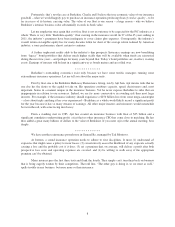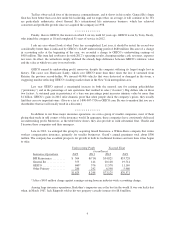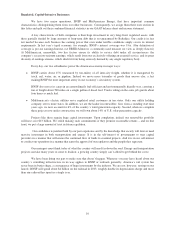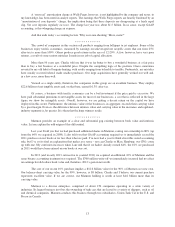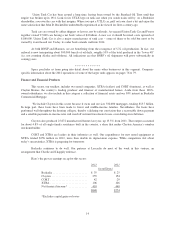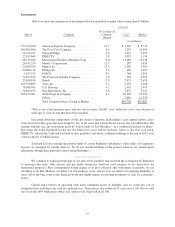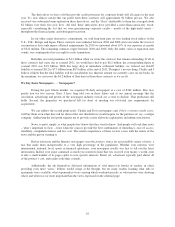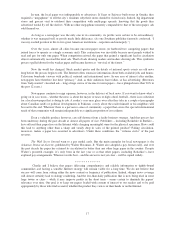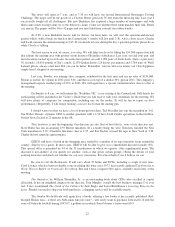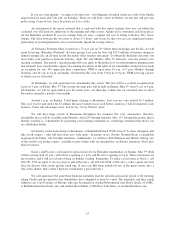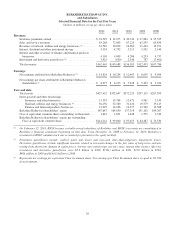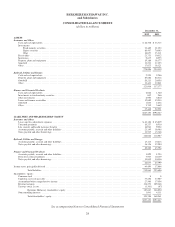Berkshire Hathaway 2012 Annual Report Download - page 20
Download and view the complete annual report
Please find page 20 of the 2012 Berkshire Hathaway annual report below. You can navigate through the pages in the report by either clicking on the pages listed below, or by using the keyword search tool below to find specific information within the annual report.Our confidence is buttressed by the availability of Terry Kroeger’s outstanding management group at the
Omaha World-Herald, a team that has the ability to oversee a large group of papers. The individual papers,
however, will be independent in their news coverage and editorial opinions. (I voted for Obama; of our 12 dailies
that endorsed a presidential candidate, 10 opted for Romney.)
Our newspapers are certainly not insulated from the forces that have been driving revenues downward.
Still, the six small dailies we owned throughout 2012 had unchanged revenues for the year, a result far superior to
that experienced by big-city dailies. Moreover, the two large papers we operated throughout the year – The Buffalo
News and the Omaha World-Herald – held their revenue loss to 3%, which was also an above-average outcome.
Among newspapers in America’s 50 largest metropolitan areas, our Buffalo and Omaha papers rank near the top in
circulation penetration of their home territories.
This popularity is no accident: Credit the editors of those papers – Margaret Sullivan at the News and Mike
Reilly at the World-Herald — for delivering information that has made their publications indispensable to
community-interested readers. (Margaret, I regret to say, recently left us to join The New York Times, whose job
offers are tough to turn down. That paper made a great hire, and we wish her the best.)
Berkshire’s cash earnings from its papers will almost certainly trend downward over time. Even a sensible
Internet strategy will not be able to prevent modest erosion. At our cost, however, I believe these papers will meet
or exceed our economic test for acquisitions. Results to date support that belief.
Charlie and I, however, still operate under economic principle 11 (detailed on page 99) and will not
continue the operation of any business doomed to unending losses. One daily paper that we acquired in a bulk
purchase from Media General was significantly unprofitable under that company’s ownership. After analyzing the
paper’s results, we saw no remedy for the losses and reluctantly shut it down. All of our remaining dailies, however,
should be profitable for a long time to come. (They are listed on page 108.) At appropriate prices – and that
means at a very low multiple of current earnings – we will purchase more papers of the type we like.
************
A milestone in Berkshire’s newspaper operations occurred at yearend when Stan Lipsey retired as publisher
of The Buffalo News. It’s no exaggeration for me to say that the News might now be extinct were it not for Stan.
Charlie and I acquired the News in April 1977. It was an evening paper, dominant on weekdays but lacking
a Sunday edition. Throughout the country, the circulation trend was toward morning papers. Moreover, Sunday
was becoming ever more critical to the profitability of metropolitan dailies. Without a Sunday paper, the News was
destined to lose out to its morning competitor, which had a fat and entrenched Sunday product.
We therefore began to print a Sunday edition late in 1977. And then all hell broke loose. Our competitor
sued us, and District Judge Charles Brieant, Jr. authored a harsh ruling that crippled the introduction of our paper.
His ruling was later reversed – after 17 long months – in a 3-0 sharp rebuke by the Second Circuit Court of Appeals.
While the appeal was pending, we lost circulation, hemorrhaged money and stood in constant danger of going out of
business.
Enter Stan Lipsey, a friend of mine from the 1960s, who, with his wife, had sold Berkshire a small Omaha
weekly. I found Stan to be an extraordinary newspaperman, knowledgeable about every aspect of circulation,
production, sales and editorial. (He was a key person in gaining that small weekly a Pulitzer Prize in 1973.) So
when I was in big trouble at the News, I asked Stan to leave his comfortable way of life in Omaha to take over in
Buffalo.
He never hesitated. Along with Murray Light, our editor, Stan persevered through four years of very dark
days until the News won the competitive struggle in 1982. Ever since, despite a difficult Buffalo economy, the
performance of the News has been exceptional. As both a friend and as a manager, Stan is simply the best.
18


